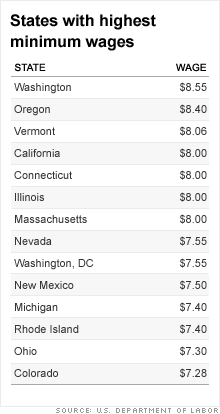Higher minimum wage coming soon
Federal wage floor will rise to $7.25 an hour on July 24. Hike will be felt in 29 states. Can the job market handle it?

NEW YORK (CNNMoney.com) -- The federal minimum wage is set to increase later this month as the job market shows signs of further decay.
The federal minimum wage will go to $7.25 an hour on July 24 from its current level of $6.55, according to the U.S. Department of Labor.
The impact will be felt in 29 states, and many of them plan to match the federal minimum when it goes through.
Seven states already have laws mandating $7.25 minimum pay, while 14 states and Washington, D.C., exceed the new minimum. Employers are required to pay whichever is the highest: Federal or state.
Last July, the wage floor was raised from $5.85 per hour. The increases were mandated by a bill passed by Congress in 2007, when the minimum was $5.15 an hour, where it had stayed for years.
But the next increase is set to occur as the job market is reeling under high unemployment and ongoing payroll cuts.
Unemployment has increased for nine months straight, achieving a 26-year high of 9.5% in June, according to the Labor Department.
Also in June, the U.S. job market shed 467,000 jobs, compared to a loss of 322,000 jobs the month before. Altogether, the U.S. economy has lost nearly 3.4 million jobs in the first half of 2009, which is more than the 3.1 million lost during all of 2008.
Many workers have taken jobs that pay far below what they're used to. Other people have given up looking. The number of people who have been unemployed for more than six months has reached nearly 4.4 million, meaning that benefits for some of the unemployed have expired.
John Lonski, chief economist for Moody's Investors Service, said the hike in the minimum wage is "going against the grain" of the economy, and that the job market might not be able to absorb the mandated increase.
"You wonder if this might be a little too much for certain employers to shoulder, especially in a time that's been marked by a decline in business sales," said Lonski. "This might actually delay the return of job growth."
The minimum wage increase will be felt most acutely by employers at restaurants, especially fast food, and also the hard-hit retail sector, according to Lonski.
"We've seen a loss of jobs in retailing, and this latest hike in the minimum wage will add to the difficulty of stabilizing employment in industries that are dependent on lesser paid workers," he said.
Advocates for low wage workers believe that a higher minimum wage is a step in the right direction, even though for many people it's barely enough to survive on.
At $7.25 an hour, a full-time worker earns $15,080. At the nationwide work week average of 33 hours, the worker would earn $12,441. The U.S. government sets the poverty level at $10,830 for one person or $22,050 for a family of four in the lower 48 states and D.C. A worker who is above the poverty level would not be eligible for certain welfare-related assistance.
"For a family to survive on $22,000, it's impossible," said Matt Goldberg, a staff attorney at the Legal Aid Center-Employment Law Center, an organization that advocates for low income workers. "A minimum wage job might technically keep you above the poverty line. But the practical reality is that anyone trying to survive on minimum wage is in real, real dire straights."
Goldberg said that San Francisco, where his organization is based, imposes its own minimum wage, of $9.79 an hour.
Higher wages increase worker productivity, reduce costly turnover and reduce dependence on government assistance, Goldberg said.
"A lot of people who are minimum wage earners are taking advantage of different kinds of public assistance," said Goldberg. "Raising those wages at the low end of the pay scale will help keep those workers off the various welfare programs.
Out of work? Looking for qualified employees? Start networking now. Join Hired! on Facebook. ![]()




